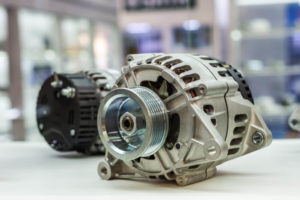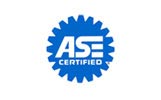Unevenly Worn Brake Pads
 Taking proper care of your car can be difficult and overwhelming, even when you have a mechanic in Greeley who helps with maintenance. There are too many systems to keep track of on your own, and between scheduled oil changes, inspections, and replacements, particularly if you own a used car or an older model, it’s easy to forget about your brakes and brake pads, especially if they aren’t making any squeaking noises.
Taking proper care of your car can be difficult and overwhelming, even when you have a mechanic in Greeley who helps with maintenance. There are too many systems to keep track of on your own, and between scheduled oil changes, inspections, and replacements, particularly if you own a used car or an older model, it’s easy to forget about your brakes and brake pads, especially if they aren’t making any squeaking noises.
One common brake problem that almost any mechanic has dealt with is uneven brake pads. When you press the brake pedal, a simple mechanism clamps down on the wheel discs. You can see these discs in the middle of the car’s wheels behind the hubcap. The brake pads are made to apply friction and pressure to these discs, essentially clamping them on both sides, to get the wheels to stop turning, thereby stopping your car.
These pads need to be replaced usually every 50,000 miles. Sometimes, the pads themselves, because they’re made of softer materials meant to grip (not grind) metal, they can be worn down unevenly. How does it happen and are there ways you can avoid it?
Causes of Unevenly Worn Brake Pads
The most common cause of unevenly worn brake pads is what mechanics call Disc Thickness Variation or DTV. Any small difference in the thickness of your discs will cause the brake pad to wear down differently over time. Thinner sections of the discs will slip through the grip of your pads more easily than thicker sections, so when there’s variation in disc thickness, your pads’ effectiveness will vary as well.
A mechanic will recommend machining the brake rotors to smooth out any thickness variation, but they can only be smoothed out by a mechanic so many times before this fix become ineffective. If you’re installing brake rotors or discs yourself, make sure you wipe them with brake cleaner first to clear the surfaces of dirt and other contaminants that could cause DTV.
Another cause of uneven brake pad wear is the brake calipers. Components of the calipers, such as the guide pins, sometimes seize up and cause the brake pad to drag along the rotor when the brakes aren’t being applied. Your Greeley mechanic can grease these pins or replace them.
When to Check Brake Pads
Checking your brake pads every 50,000 miles is a good rule of thumb, but there are several noticeable symptoms of brake pad wear that you should pay attention to. First, if you have any difficulty braking, you don’t need us to tell you to visit a mechanic immediately. But another nearly surefire sign that your rotors are wearing on your brake pads unevenly is your steering wheel shaking when you apply the brakes. Mechanics will sometimes find that your pads have been worn through in this case and will likely suggest a replacement.
Visit Autotailor in Greeley for an inspection to determine the health of your brake pads and your entire braking system.
Questions to Ask When Choosing a Local Mechanic
 We’ve all needed last-minute car repairs at times, and too often we rush to the nearest mechanic rather than finding the most reliable Greeley mechanic for help. Sometimes, we don’t have much of a choice in mechanics because we need something done right away. But what about routine maintenance, or when your Check Engine light comes on? Choosing a reliable local mechanic can be a challenge at times, and it’s a nerve-wracking decision because it involves hundreds if not thousands of dollars being spent on your car.
We’ve all needed last-minute car repairs at times, and too often we rush to the nearest mechanic rather than finding the most reliable Greeley mechanic for help. Sometimes, we don’t have much of a choice in mechanics because we need something done right away. But what about routine maintenance, or when your Check Engine light comes on? Choosing a reliable local mechanic can be a challenge at times, and it’s a nerve-wracking decision because it involves hundreds if not thousands of dollars being spent on your car.
Finding the Most Reliable Mechanic
It can feel impossible to learn how reliable or skilled a prospective mechanic is before you pay them, but if you ask the mechanic these questions, you’ll get a better sense of whether you want to give them your business:
Can You Work on My Make and Model?
Most mechanics will say ‘yes’ to this question and find out if they can actually do the work later, but it doesn’t hurt to ask what the shop specializes in and whether they can handle your car. This should be your first question after you research mechanics who specialize in certain cars, such as Japanese or European models.
What Automotive Associations are You Certified With?
There are several reputable automotive associations out there that hold auto shops to certain standards. The most common is the National Institute for Automotive Service Excellence. If the mechanic is certified by this group, they’ll say they’re ASE-certified. AAA (known for its roadside assistance service) is another organization that certifies mechanics across the country.
My Car is Making a Strange Noise. What Could it Be?
You should be able to call and ask any mechanic any question about your car. Usually, they’ll say, “Well, I’d have to look at it first but…” and give you a few ideas about what your issue might be. You should be comfortable asking any and all questions that come to your mind about your car and its performance. Too many people are afraid to ask questions and end up paying more for repairs later. Compare their responses to other mechanics to get an idea of how they operate.
What Should I Do?
Sometimes the best test of a reliable Greeley mechanic is asking them what they would do in your shoes. It might not be worth it to make certain repairs on cars a certain number of years old, for instance. There might be a cheaper repair that a mechanic can do that will solve your problem better than a more expensive one. Make judgments on how honest the mechanic is when you ask questions like this. The mechanics that don’t automatically upsell you repairs you don’t need are the ones you want.
Which Repairs Should I Prioritize?
If you take your car in for an inspection and the mechanic hands you a laundry list of work they feel they need to do, ask which ones they consider a top priority and which can be put off. A reliable mechanic will be happy to recommend which need to be done now and which can wait.
Experiencing issues with your car? Contact the mechanics at Autotailor today to learn how they can help.
Learning About Your Car’s Alternator
 For many people looking for auto repair in Greeley, the alternator is a common problem. It can cause many costly repairs and is frequently the bane of many Northern Colorado drivers’ existence. Numerous people come in with alternator problems, but they don’t know why the alternator is so important or what it does.
For many people looking for auto repair in Greeley, the alternator is a common problem. It can cause many costly repairs and is frequently the bane of many Northern Colorado drivers’ existence. Numerous people come in with alternator problems, but they don’t know why the alternator is so important or what it does.
What the Alternator Does for Your Car
According to Samarins.com, your car’s alternator is a generator of electric power and a major component of the engine’s charging system. Every car with a combustible engine, with the exception of some hybrids, has an alternator. When the engine runs, the alternator charges the battery and acts as an energy supply for the vehicle’s electrical systems. When your battery runs down and you have to run your engine to charge it again, the alternator does the work. Alternators are bolted to the engine and are driven by a serpentine, or drive, belt.
You might be surprised that your alternator is usually maintenance-free. Typically, they last 10 to 15 years without needing to be repaired. When the alternator fails, the battery sometimes runs the car for a time, but eventually, the battery will run out of power and die.
The most common action car repair experts will take is to simply replace the part, a task that is actually not so simple and can be very expensive.
Typically, your car expert will test your alternator by using a charging system device, which will indicate if the charging system is weak or inoperable. Maintenance experts can also use this to determine if one of the alternator diodes has failed.
Rebuild vs. Replacement
An auto repair expert in Greeley can also rebuild your alternator, instead of replacing it, for much less. Usually, your auto repair shop will need to send the failed alternator to a specialized alternator/starter rebuilding shop.
Many times, if you see a battery warning light or a dashboard light that says GEN or ALT, the problem could be the alternator. An alternator replacement or rebuild will be your options. Car experts can also rebuild an alternator at home, but it is difficult to do on your own and can take longer than replacing it. However, alternator rebuild kits are usually available for less than replacing the alternator or going to a rebuild shop. Please remember that it’s not advisable to do a DIY repair if you don’t have the experience necessary just to save money when the function and safety of your car are at stake.
Alternator or Battery?
It can be difficult at first to diagnose your vehicle’s electrical issues without taking your car to the shop. Obviously, the difference between replacing a battery and replacing an alternator is hundreds of dollars, but there are a number of signs that could point toward whether it’s your alternator or battery. Some indications of a failing alternator could include service engine lights as we mentioned earlier, a stalling engine, strange noises, and more. Check out this article for more about diagnosing a bad alternator.
How to Maintain Your Car’s Alternator
Keeping your alternator from failing will save you hundreds of dollars in the future. Keeping it up and running properly comes down to three basic concepts: make sure you have the right drive belt, keep your engine relatively debris-free, and keep your alternator properly aligned.
One of the first things auto repair experts look at when examining your alternator and engine is the drive belt. These belts will fray and crack over time, usually between 40,000 and 70,000 miles. It’s a good idea to replace the belt at the first sign of aging or damage.
Alternators, just like engines, run best when they’re not overheated. Dust, dirt, and other debris are often the culprits of overheated engines and alternators. Always inspect your engine and alternator and clean out any debris. If you see an excessive amount of debris there, air could not be getting to your alternator.
As things get jostled around by the roadways, all that movement can tip your car’s pulleys, throwing off your engine’s alignment. The crankshaft and alternator pulleys have to be perfectly aligned to work properly without excessive wear and tear. Minor damage to the drive belt and other small factors can affect crankshaft and alternator alignment.
If you have questions about your alternator or other maintenance issues, contact Autotailor today.
Your Holiday Vacation Car Maintenance Checklist
 Before your holiday road trip this year, you may want to check out some options for car maintenance services in Greeley to make sure your car is in top travel shape. A professional will make sure all the little things that can turn into more concerning issues are in order and ready to compensate for ice, snow, and cold. Whether you’re going to visit grandma or taking a ski trip, there are plenty of things you should check out and repair before you begin your journey to make sure you get yourself and your family to and from your destination safely. Here’s a brief car maintenance checklist to get you started.
Before your holiday road trip this year, you may want to check out some options for car maintenance services in Greeley to make sure your car is in top travel shape. A professional will make sure all the little things that can turn into more concerning issues are in order and ready to compensate for ice, snow, and cold. Whether you’re going to visit grandma or taking a ski trip, there are plenty of things you should check out and repair before you begin your journey to make sure you get yourself and your family to and from your destination safely. Here’s a brief car maintenance checklist to get you started.
Car Maintenance in the Cold
Regular car maintenance means much more in the cold. Hot weather, of course, affects engines, but cars in general don’t like the cold. For more information about cold weather maintenance, click here.
- Protect the exterior
Colorado winters can be harsh for car exteriors. The snow, ice, and road salt can break down your car’s paint job and cause damage over time. Before you head out, give your car a good cleaning and apply a quality car wax to protect against another round of sand, ice, and salt.
- Change your oil
Cold weather is the best time to consider switching from conventional motor oil to synthetic oil because full-synthetic oil flows easier and freer at low temperatures than conventional oil. You can also try a synthetic blend for a similar effect. Be sure to get your mechanic’s recommendations on the best oil choice for your vehicle.
- Take care of your battery
Your vehicle’s batteries are affected by the cold, winter weather. After a long, hot summer, batteries will be sluggish in cold weather, especially if you don’t use your car every day. Test your battery and charging system frequently to make sure your car can start in the cold mornings. The last thing you want is to end up with a dead battery during your travels.
Car Maintenance: Being Prepared
Being prepared is the best way to keep your car up and running in any season, hot or cold. Make sure you’re taking these regular precautions with your car maintenance this winter, and check out this link for more safe travel tips.
- Check transmission and differential fluids
Aside from oil, your car has many other fluid reservoirs that need to be replenished and maintained. Your transmission fluid and other lubricants for other systems like the drive axle don’t have to be changed nearly as frequently as your oil, but they need to be checked all the same. Read your car’s manual to find out how often they need to be changed.
- Belts
Your engine belts make your engine turn. Hold the belts in your hands and turn them sideways so you can see the friction surface. If there’s excess wear, fraying, tears, or cracking, it’s a good idea to have them replaced before any long trip.
- Tire pressure and tread
Your tires will wear down in any weather, so make sure your tread is worn evenly and that your tires have been rotated recently. Excess wear on your tire tread can lead an unsafe situation on the road, especially if the road is slippery and cold.
Conclusion
Making sure your car is safe to travel this winter is all about maintaining the normal functions of all of your car’s many moving parts. Make sure your fluids are doing what they’re supposed to do and that your car parts are functioning properly in the cold.
Looking help beyond a holiday car maintenance checklist? Please call us to schedule an appointment for your vehicle’s maintenance today.
The Five Telltale Signs That Your Car Needs a Mechanic
 How do you know if your car needs a mechanic visit? Aside from regularly scheduled tune-ups and top-offs, your car will periodically need to be checked out by a Greeley auto repair professional to fix certain issues and prevent irreparable damage. In most vehicles, a small problem can soon turn into a catastrophic one quickly, so visiting a mechanic as soon as possible is important.
How do you know if your car needs a mechanic visit? Aside from regularly scheduled tune-ups and top-offs, your car will periodically need to be checked out by a Greeley auto repair professional to fix certain issues and prevent irreparable damage. In most vehicles, a small problem can soon turn into a catastrophic one quickly, so visiting a mechanic as soon as possible is important.
Here are five symptoms you should pay attention to and seek the help of an auto repair professional if you see them in your car:
Smoke Coming From Under the Hood
You probably already know that smoke coming from under your hood is never a good sign. Sometimes, smoke coming from your exhaust pipes can also show potential damage to the engine or other problems.
If you notice that blue smoke is coming from your exhaust pipe or your hood, stop your car as soon as possible and get a tow to the garage. Blue smoke means engine oil is leaking. Low oil levels can lead to serious engine problems and could mean thousands of dollars in repairs.
If you notice white smoke coming from your hood or an excessive amount coming from your tailpipe, it’s probably steam. Your engine is overheated. While this isn’t as serious of a problem as leaking oil, you’ll need to wait for your engine to cool down before you can add coolant. Still, you should seek professional help to find out why your engine overheated in the first place.
Check out these tips on finding a trusted, professional mechanic.
Certain Bad Smells
No one’s car will smell like fresh alpine valleys or roses, but certain smells can mean engine trouble. If the inside of your vehicle ever smells like you’re standing right behind your car’s tailpipe you’re probably breathing carbon monoxide, a highly toxic and potentially deadly gas. Roll your windows down on your way to the mechanic.
If you smell burning rubber, it means you burnt out your tires (you’d know it if you did this) or your drive belts or accessory belts are worn out or damaged. It could also mean that a rubber hose is dislodged and melting.
Unsettling Noises
If you hear a tapping or popping sound, it could be a problem with your engine’s cylinders. If you hear a grinding noise when you start your car, it could be your starter motor. Grinding when you shift gears is a sign that you could need a transmission replacement.
Warning Lights
You can take warning lights on your dashboard with a grain of salt sometimes, but there are a few lights that you should take heed of immediately: Check Oil/Oil Level Low, Oil Pressure Low, and Check Engine. Oil levels and pressures are very important because your oil prevents your engine’s various moving parts from rubbing against each other, causing serious damage. If you’re unsure of how to ameliorate your oil warning light, take your car to a mechanic.
That pesky Check Engine light can mean any number of things, from not screwing your gas cap on properly the last time you re-fueled to your pistons are about to fly through your hood. After you’ve checked routine things like gas caps and oil levels, take your car in if the Check Engine light doesn’t turn off.
Jerky Driving
If your car seems to lurch and stop when you’re not applying the brake, it’s a good sign of engine trouble. Not having full control of the accelerator can cause serious driving problems, so it’s a good idea to have it checked out as soon as possible.
Watch for these telltale signs of engine trouble, and if you see these signs, don’t hesitate to contact a mechanic immediately. When your car needs a mechanic, waiting too long could further the damage.
Looking for a mechanic in Greeley? Call us today.



